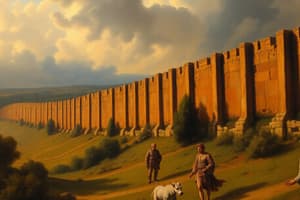Podcast
Questions and Answers
Gii Caesar lei guovddážis olbmu Romani politihkain maŋŋil Romani Dáiddahutkis?
Gii Caesar lei guovddážis olbmu Romani politihkain maŋŋil Romani Dáiddahutkis?
- Ii, son lei fálli gii bođii garrasit Romanii
- Juo, son ávkkálastá su militára máhtuide olámušttit fámu (correct)
- Ii, son lei dušše vuorrasažžan olbmun geas lei unnán mearkkašupmi
- Juo, muhto su rollan lei váidnilmas
Gii lei vuosttas Romani Imperadora?
Gii lei vuosttas Romani Imperadora?
- Marcus Aurelius
- Octavianus, gean maiddái govviduvvui Augustus (correct)
- Domitian
- Gaius Julius Caesar
Maid daddjon Romani servodat iežas hierarkkalaš olmmošklasaide?
Maid daddjon Romani servodat iežas hierarkkalaš olmmošklasaide?
- Dat lei olu seammalágan go modern servodat ihttin
- Dat lei juohkán olbmuide geat ledje Romas ja Imperi olbmuide
- Dat lei juohkán patrisiaide (ađđaolbmuide), plebeiiaide (olbmuide) ja trillaide (correct)
- Dat lei juohkán gonagasaide, ráđđeheddjiide ja duolbmaide
Maid Romani nissonat diktibunne servodagas?
Maid Romani nissonat diktibunne servodagas?
Maid daddjon maŋŋil Romani Imperiija njoamuddama?
Maid daddjon maŋŋil Romani Imperiija njoamuddama?
Flashcards are hidden until you start studying
Study Notes
Rome's Rich Historical Landscape
The Roman Empire
Founded in approximately the ninth or tenth century BCE, Rome started as a small Italian settlement located on the banks of the Tiber River. Over centuries, it evolved into a powerful empire that dominated Europe, North Africa, and parts of the Middle East. Rome's influence can be traced through its lasting impact on language, government, architecture, and various elements of modern society.
Early Growth and Development
Initially governed by a series of kings, Rome transitioned into a republic around 509 BCE. This shift marked the beginning of representative government, where some citizens could vote for their leaders and influence decision-making processes. During this period, Rome expanded its territorial reach by conquering neighboring regions and establishing colonies.
Expansion and Consolidation
Over several centuries, Rome consolidated its power through strategic military campaigns and diplomatic alliances. It defeated its primary rival, Carthage, in 146 BCE, securing control over the western Mediterranean Sea. Subsequently, Rome conquered Greece, further expanding its influence. Despite periods of internal strife and civil wars, Rome maintained its dominance until the third century CE.
Roman Emperors
As the Roman Republic transformed into an empire, a series of influential rulers emerged. These individuals played significant roles in shaping the empire's trajectory and shaping the course of human history.
Julius Caesar
Gaius Julius Caesar became a pivotal figure in Roman politics during the late Roman Republic. He leveraged his military prowess to accumulate power, ultimately seizing control of the government in Rome. His rule marked the beginning of autocratic leadership in Rome, leading to the establishment of the Roman Empire.
Augustus
Octavian, better known as Augustus, was Rome's first emperor, reigning from 27 BCE to 14 CE. Under his leadership, the Roman Empire reached the height of its glory. Augustus implemented significant reforms aimed at strengthening the state and enhancing Roman values.
Later Empires
Following the decline of the traditional Roman Empire, several smaller entities emerged, including the Eastern Roman Empire and the Holy Roman Empire. Each of these successor states contributed to the evolution of Roman governance and influenced European history in meaningful ways.
Roman Society
Roman society was characterized by a complex hierarchy of social classes and gender roles. At the top were patricians, members of noble families who held high office and controlled considerable wealth. Below them were plebeians, representing the bulk of the citizenry. Enslaved individuals also formed a significant portion of Roman society, performing various tasks in households, industries, and agriculture.
Social Life and Customs
Despite differences in class, Roman society placed emphasis on shared values and religious beliefs. Citizens engaged in communal activities such as attending entertainment venues, participating in civic ceremonies, and visiting public baths. Additionally, Roman men and women pursued distinct yet interconnected spheres of activity, with women playing vital roles in childcare, domestic affairs, and religious rituals.
Studying That Suits You
Use AI to generate personalized quizzes and flashcards to suit your learning preferences.




